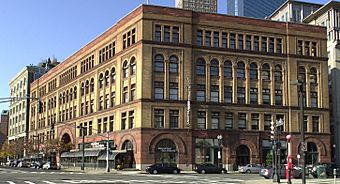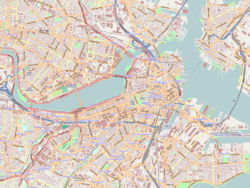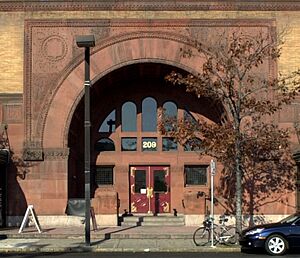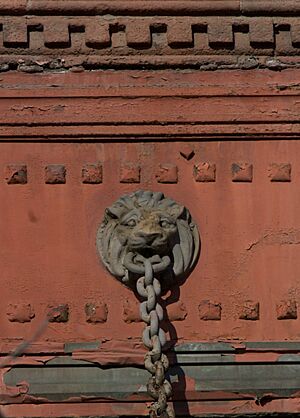Youth's Companion Building facts for kids
Quick facts for kids |
|
|
Youth's Companion Building
|
|

Columbus Ave and Berkeley Street facades
|
|
| Location | 209 Columbus Ave. Boston, Massachusetts |
|---|---|
| Area | 0.6 acres (0.24 ha) |
| Built | 1892 |
| Architect | Hartwell and Richardson |
| Architectural style | Romanesque, Richardsonian Romanesque |
| NRHP reference No. | 74000393 |
| Added to NRHP | May 02, 1974 |
The Youth's Companion Building is a historic place in Boston, Massachusetts. You can find it at 209 Columbus Avenue. This building is super special because the famous Pledge of Allegiance was written and first shared with the world right here! That's why it's also called the Pledge of Allegiance Building. It was built in 1892 and became a protected historic site in 1974.
The Youth's Companion Building
This building was once the main office for The Youth's Companion magazine. Daniel Ford owned and edited this magazine. He was a big supporter of the Pledge of Allegiance. He even built this amazing building just for his magazine! The magazine moved its main office here in 1892. It stayed here until 1915, when it moved to a new spot near Boston University.
A Special Design
The building was designed by two architects, Henry W. Hartwell and William Cummings Richardson. They made it both beautiful and practical. It had lots of natural light from windows and skylights. The building is made of brown sandstone and matching brick. It looks very strong and important, like a bank!
You can see big arched windows and deeply set arched doors on the outside. If you walk under the main arch, you enter a tall entrance area that is two stories high. Inside, all the wood was made of oak. There were even heavily carved oak benches for visitors to sit on while they waited.
These architects also designed other important buildings in the Boston area. Some of their other works include the Belmont Town Hall and Christ Church in Andover.
What Happened Inside?
When The Youth's Companion magazine used the building, each floor had a special job.
Busy Floors
- The first floor held the business office. This is where they handled letters and managed subscriptions. It also had the advertising department. Daniel Ford's own office was at the back of this floor.
- The third floor was for the "premium department." This is where they packed and mailed out gifts or special items. It also had machines for stitching the magazines together.
- The fifth floor was where all the creative work happened. This included the editorial offices and the art department. There was also a library with a huge collection of articles. These articles came from over 200 magazines from all over the world!
- The basement was a busy place too. It had the press room, where the magazines were printed. There were also machines for gathering pages and steam boilers. These boilers helped power the binding equipment. Two dynamos in the basement even made electricity for the building's lights!
 | Isaac Myers |
 | D. Hamilton Jackson |
 | A. Philip Randolph |






